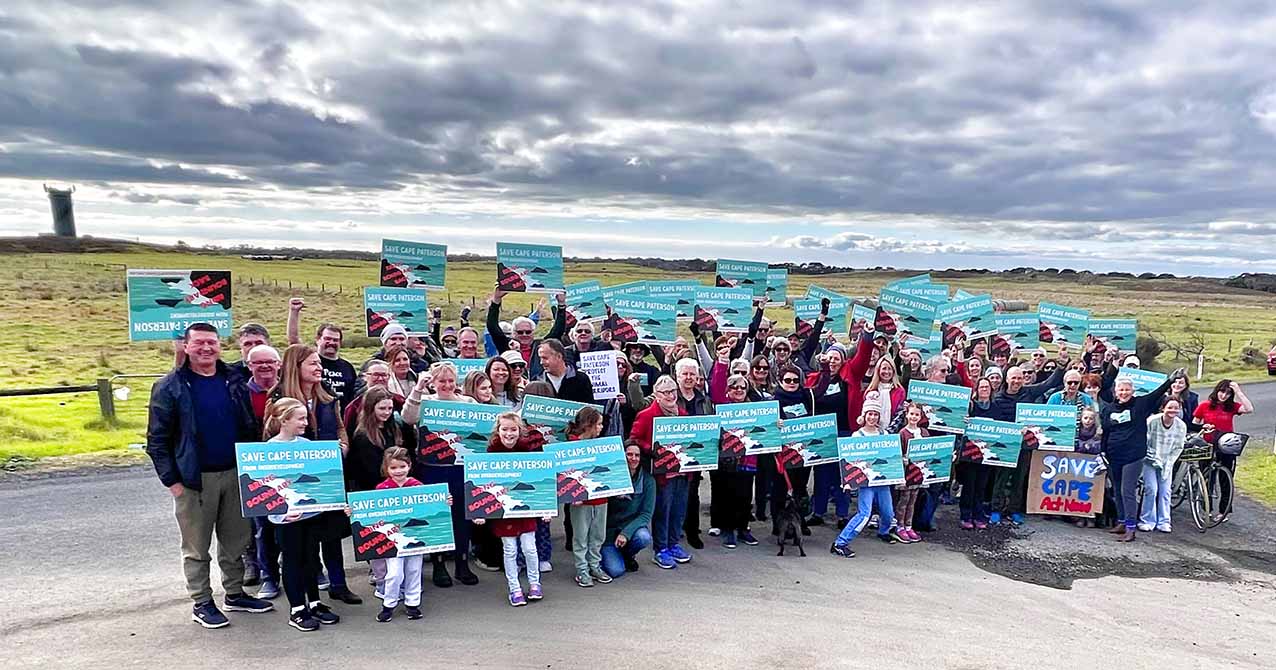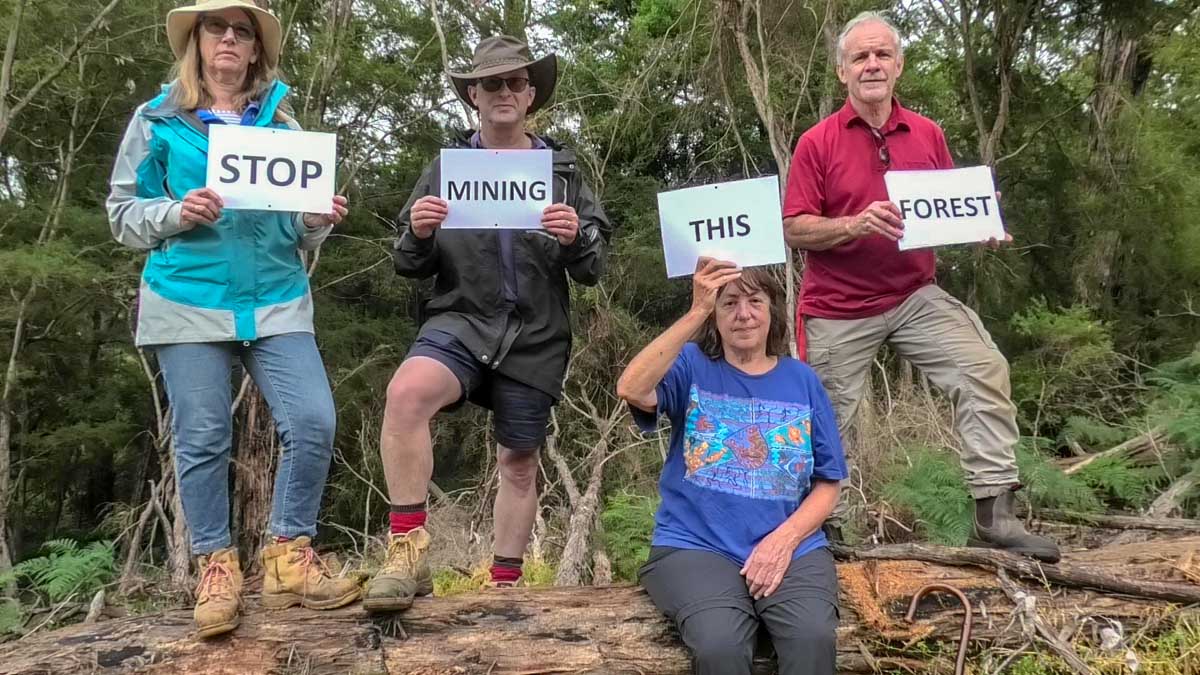By Catherine Watson
LOCAL community groups say they have made some progress at the panel hearings into the Bass Coast Distinctive Areas and Landcapes (DAL) project, but there is a long way to go.
The future of sand mining in the Western Port Woodlands and the Cape Paterson township boundary are the two most contentious issues for the panel, attracting 500-plus and 270 submissions respectively.
The biodiversity value of the woodlands was acknowledged during the first weeks of the panel hearings, buoying members of a woodlands coalition representing Save Western Port Woodlands, the South Gippsland Conservation Society and the Victorian National Parks Association.
LOCAL community groups say they have made some progress at the panel hearings into the Bass Coast Distinctive Areas and Landcapes (DAL) project, but there is a long way to go.
The future of sand mining in the Western Port Woodlands and the Cape Paterson township boundary are the two most contentious issues for the panel, attracting 500-plus and 270 submissions respectively.
The biodiversity value of the woodlands was acknowledged during the first weeks of the panel hearings, buoying members of a woodlands coalition representing Save Western Port Woodlands, the South Gippsland Conservation Society and the Victorian National Parks Association.
The Department of Transport and Planning (DTP) and the panel concurred with a conclave of ecology experts who assessed the woodlands as a place of national significance. DTP accepted the recommendations of the conclave that:
Save Western Port Woodlands member Neil Rankine said this was a significant change after the draft SPP acknowledged the woodlands (referred to as “the Gurdies Hills”) only as a series of isolated nature reserves and landscapes of no great significance.
Despite recognising the conservation value of the woodlands, however, DTP argues that the SPP should not elevate environmental protection above protection of the sand resource but balance the competing values. They also argue the SPP is not the right vehicle to protect the woodlands.
Mr Rankine said that if the panel accepted this view, there would essentially be no change to the current decision-making process on sand mining applications in the woodlands.
“Whether it’s achieved through an overlay or native vegetation precinct plan, it’s vital that we achieve a blanket protection or we will be fighting the same battles over and over again until the woodlands are whittled away.”
Cape Paterson Residents and Ratepayers Association (CPRRA) representative David Hayward was generally optimistic after the first weeks of the hearing.
The Cape Paterson township boundary was expanded by the then Liberal State Government in 2011, against the advice of independent planning panels, to include 110 hectares of farming land north of Seaward Drive for residential development. CPRRA is arguing for the boundary to be returned to its original position.
Cape residents make up just over 2 per cent of the Bass Coast population but made 37 per cent of the submissions.
“We don’t have the money to pay for lawyers or expert witnesses so we decided to take a community based approach with our experts by experience
Mr Hayward said the process had been manageable and he felt the panel chairwoman Kathy Mitchell had given them a fair hearing.
“We have some really good people working on the Cape Paterson case – retired academics and others with great local knowledge. People have been taking photos for 30 years. So far we feel like we’ve prosecuted a pretty good case.”
Mr Hayward said they were heartened by the evidence of DTP’s own landscape expert, Claire Scott, who has recommended that the boundary should be returned to its pre-2011 position.
“We have had some success in countering the economists who argue that housing choice is a vital consideration when the DAL itself says the landscape and ecology matter more.
“Everything is going well in terms of the evidence. We feel we have a strong case. But at this stage we haven’t convinced the council or DTP to change their minds.”
Both community groups have a respite over the next two weeks while advocates argue for an expansion of town boundaries in the interests of developers and landowners.
Week 6 of the hearing (April 12-14), featuring presentations by the woodlands coalition and the Cape Paterson Residents and Ratepayers Association, will be held in the Wonthaggi Town Hall.
Week 7, featuring presentations by local community members on the woodlands and Cape boundary, will be at the Silverwaters Resort in San Remo.
All sessions are also accessible online. View the updated DAL hearing timetable with full links to all sessions.
- The SPP (Bass Coast Statement of Planning Policy) should explicitly recognise the unique, significant and intrinsic biodiversity value of the WPW corridor as a whole, irrespective of land tenure, and the potential for cumulative, permanent impacts associated with extractive industries in the region.
- The SPP should acknowledge the direct conflict between current and future mining operations and the conservation of biodiversity in the region.
- The SPP should prioritise the conservation and enhancement of existing habitats across all land types, and connection of these habitats based on species needs, not land tenure or management.
- The SPP text and strategies ought to be amended, as required, to reflect the above recommendations.
Save Western Port Woodlands member Neil Rankine said this was a significant change after the draft SPP acknowledged the woodlands (referred to as “the Gurdies Hills”) only as a series of isolated nature reserves and landscapes of no great significance.
Despite recognising the conservation value of the woodlands, however, DTP argues that the SPP should not elevate environmental protection above protection of the sand resource but balance the competing values. They also argue the SPP is not the right vehicle to protect the woodlands.
Mr Rankine said that if the panel accepted this view, there would essentially be no change to the current decision-making process on sand mining applications in the woodlands.
“Whether it’s achieved through an overlay or native vegetation precinct plan, it’s vital that we achieve a blanket protection or we will be fighting the same battles over and over again until the woodlands are whittled away.”
Cape Paterson Residents and Ratepayers Association (CPRRA) representative David Hayward was generally optimistic after the first weeks of the hearing.
The Cape Paterson township boundary was expanded by the then Liberal State Government in 2011, against the advice of independent planning panels, to include 110 hectares of farming land north of Seaward Drive for residential development. CPRRA is arguing for the boundary to be returned to its original position.
Cape residents make up just over 2 per cent of the Bass Coast population but made 37 per cent of the submissions.
“We don’t have the money to pay for lawyers or expert witnesses so we decided to take a community based approach with our experts by experience
Mr Hayward said the process had been manageable and he felt the panel chairwoman Kathy Mitchell had given them a fair hearing.
“We have some really good people working on the Cape Paterson case – retired academics and others with great local knowledge. People have been taking photos for 30 years. So far we feel like we’ve prosecuted a pretty good case.”
Mr Hayward said they were heartened by the evidence of DTP’s own landscape expert, Claire Scott, who has recommended that the boundary should be returned to its pre-2011 position.
“We have had some success in countering the economists who argue that housing choice is a vital consideration when the DAL itself says the landscape and ecology matter more.
“Everything is going well in terms of the evidence. We feel we have a strong case. But at this stage we haven’t convinced the council or DTP to change their minds.”
Both community groups have a respite over the next two weeks while advocates argue for an expansion of town boundaries in the interests of developers and landowners.
Week 6 of the hearing (April 12-14), featuring presentations by the woodlands coalition and the Cape Paterson Residents and Ratepayers Association, will be held in the Wonthaggi Town Hall.
Week 7, featuring presentations by local community members on the woodlands and Cape boundary, will be at the Silverwaters Resort in San Remo.
All sessions are also accessible online. View the updated DAL hearing timetable with full links to all sessions.

